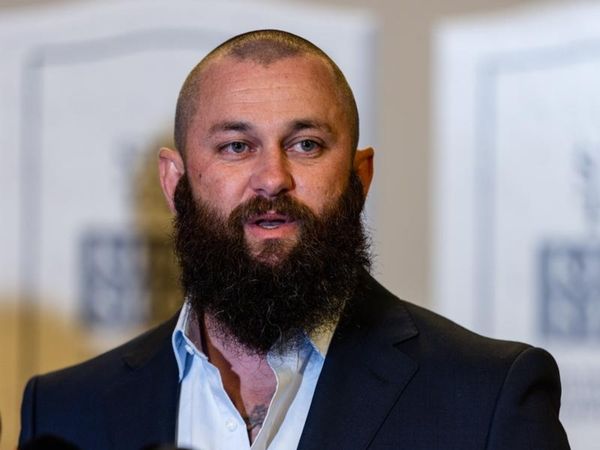As an office worker, Jo Mcneill never thought she would become one of hundreds of Australians with a disease usually seen among stonemasons.
But after five years in an administrative role at a Victorian quarry, that's exactly what a general medical check-up confirmed.
"I came back from maternity leave and … got told there was something on my lungs, went for a few CT scans and then was asked to have a lung biopsy," she said.
"I was told, 'You have silicosis', and I had no idea what it was."
Silicosis is an incurable lung disease caused by breathing in tiny particles of silica, or crystalline silica, a mineral used to make kitchen benches and tiles.
Workers who cut or file engineered stone products are diagnosed with silicosis at a much higher rate than the general population.
But Ms Mcneill said she knew nothing about those risks during her years working 90 metres away from a crushing plant.
"As I went back [over safety briefings], there's not one thing about crystalline silica dust at all," she said.
"If someone said to me, 'Hey Jo, do you want a job here, but the site's full of asbestos?', I'd be like, 'No, thank you'.
"So why not tell us about what silica is? Because it's the same."
'The asbestos of the 2020s'
Ms Mcneill has told her story as part of a new campaign calling on the federal government to immediately ban engineered stone imports and manufacturing.
Engineered stone is a popular material used for benchtops in kitchens and bathrooms, but is particularly dangerous for workers because it can contain high levels of silica.
The ABC has reported on concerns about engineered stone benches as far back as 2018, with doctors warning one-in-three stonemasons who were tested had signs of silicosis.
The union that represents stonemasons, the Construction, Forestry, Maritime, Mining and Energy Union (CMFEU), said it would ban its members from working on engineered stone products by mid-2024 if the government did not step in.
Without a ban, an estimated 100,000 workers could contract silicosis in the next 50 years, the union said.
"The science is clear-cut: engineered stone is killing workers," incoming CMFEU boss Zach Smith said.
"There is no safe level of exposure to engineered stone.
"This is the asbestos of the 2020s."
Silicosis is preventable but it is not curable, said Jane Bourke from Monash University.
"The diagnosis is an irreversible diagnosis. So if you have silicosis, you're going to have that for life," Dr Bourke said.
Young people getting a 'death sentence'
For some people with silicosis, like former stonemason Kyle Goodwin, the disease can be fatal.
About four and a half years ago, Mr Goodwin was told he had between five and eight years to live.
"It breaks my heart to see my friends with their young families faced with a death sentence from what is a preventable disease," he said.
"That's what we're faced with: it's a death sentence. There's nothing we can do. There's no cure. There's no treatment."
Like Ms Mcneill, Mr Goodwin said he was not aware of just how dangerous working with engineered stone products could be.
"Obviously, when you work around any dust, you know that dust isn't good. But we didn't know what it was going to cause — we had no idea," he said.
Physician Ryan Hoy said the issue was "one of the biggest failures of workplace health and safety we've seen".
"This is something that should have been detected almost 20 years ago, but really has gone under the radar for that length of time, resulting in an enormous number of workers being exposed to extremely hazardous environments," he said.
The first Australian case of silicosis linked to engineered stone was detected in 2015, but since then almost 580 cases have been diagnosed among stonemasons from an estimated workforce of about 4,000.
Australian Council of Trade Unions assistant secretary Liam O'Brien said Australia was on the cusp of an "industrial epidemic" that would "dwarf" asbestos.
"We need to act urgently to protect workers from this horrible, horrible disease," he said.
Import ban to be considered
Workplace health and safety ministers from across the country will meet next week to discuss whether a tougher approach is needed.
Health Minister Mark Butler said an import ban was "obviously an option that will be considered".
"We're determined to do what we can to protect the health of Australians," he said.
Among those who fully support a ban on engineered stone is Brisbane stonemason Duane Calvey, 33, who also lives with silicosis.
He said even measures like wet processing and wearing fitted masks could not fully prevent silica dust exposure.
"I don't believe there's any safe way to work with it, where dust isn't going to be taken with somebody on their clothes or on their skin," he said.
"It's unavoidable."
Mr Calvey, who has been in the industry for 13 years, said he found the diagnosis devastating because he was passionate about his work.
"Looking back on it, I think there should have been some more duty of care from employers," he said.
As for Ms Mcneill, having silicosis has changed her whole life.
"I have a lot of anxiety. I have health issues that are popping up all the time," she said.
She said she worried most about her future as a single mum with her two daughters, aged four and six.
"I want to be there for them because I don't know what my future holds," she said.










